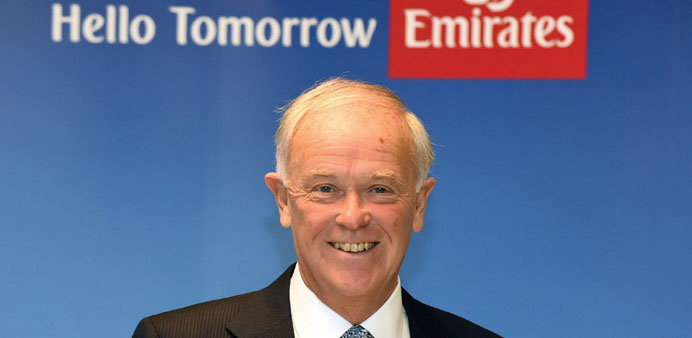Tim Clark, CEO of Emirates Airlines, poses for photographers before a news conference in Berlin yesterday. Emirates and the other Gulf airlines targeted by the US allegations have not been given a fair chance to respond to a report that took two years to compile, Clark said.
Bloomberg/Toulouse/ Washington
Emirates President Tim Clark said he’ll travel to Washington this month to defend his airline against allegations from US carriers that Gulf operators receive “market-distorting” subsidies from their governments.
Clark said he’ll meet with senior politicians to make his case, as he called the complaints by US carriers “bluster and flimflam.”
Emirates and the other Gulf airlines targeted by the US allegations have not been given a fair chance to respond to a report that Clark said took two years to compile, the executive said.
“I’m surprised it got as far as it has without a response by the guys involved,” Clark told journalists in Berlin yesterday. “I have a problem with form, not with substance. We will deal with substance.”
The three biggest US airlines are turning to Congress for help in tightening aviation treaties with Qatar and the UAE, two people familiar with the matter have said. US carriers say the Gulf companies are able to undercut competitors on fares, a charge Clark yesterday rebuffed, saying he’s targeting markets that have little overlap with those of US carriers and give consumers better connectivity.
“We built a balance sheet from zero into one of the most formidable balance sheets in the industry,” Clark said. “To be told it’s a sham is a pity.”
Clark said Emirates has added value to the US cities it serves with “very reasonable” fares and connections that are more favourable than those provided by his US competitors. On his trip to Washington, Clark said he’d try and meet “as many people as we can” to state his case, which he said is “a good story.”
“They must be prepared for a very robust response from us,” Clark said of the US carriers, calling their attacks “grossly unfair” and “very serious.”
Clark’s rebuttal echoes similar comments by Qatar Airways chief executive officer Akbar al-Baker, who said on Wednesday in Berlin that “if you accuse somebody, you should also tell him or give him the details of the accusations so you can defend yourself.”
US carriers including American Airlines Group, United Airlines and Delta Air Lines should review their long-haul philosophy instead of trying to roll back the advancements in connectivity that Emirates and its Gulf counterparts have established in recent years, Clark said.
The Emirates executive said he sees little risk of open-skies agreements in Europe and the US actually being challenged, as there is too much at stake economically to roll them back.
Emirates, which operates the largest fleet of Airbus Group A380 superjumbos and Boeing Co 777 wide-bodies out of its hub in Dubai, now runs 59 A380s out of an order for 140 in total. Clark said he’d entertain a top-up of between 100 and 200 of the world’s biggest passenger plane if Airbus considers putting fresh engines on the double-decker.
Should Airbus embark on a so-called re-engining of the A380, the Toulouse, France-based plane maker is most likely to pick Rolls-Royce Holdings as its partner, using a derivate of the Trent XWB engine now deployed on the Airbus A350, Clark said.
Emirates’ existing fleet of A380s uses the competing power plant by General Electric and United Technologies Corp, which Clark said are unlikely to re-engine.
Clark said he was more concerned six months ago than he is now that Airbus would drop the A380 outright because of a lack of orders. Airbus would be better advised to stick with the plane because the model is best equipped to serve congested travel routes, and because it is a symbol of European manufacturing.
Airbus’s board may make a decision on an A380neo by the middle of this year, Clark said.

